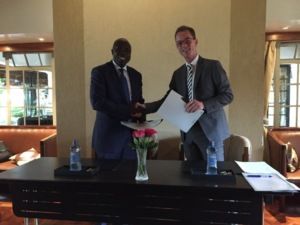News
Danish food products on the menu in Kenya
This article is more than 9 years old.
Enben Lunde Larsen looking to capitalise on the east African’s great untapped potential

Esben Lunde Larsen sealing Kenyan co-op (photo: Miljø- og Fødevareministeriet)
The environment and food minister Esben Lunde Larsen has signed a co-operation agreement with Kenya that will improve food security in the African nation.
Larsen is in Kenya this week as part of a Danish export delegation which is also aiming to gain a foothold in the country and boost its ability to produce more fresh fruit, vegetables and dairy products.
“Kenya has considerable potential as a food-producing and food-exporting nation, and it’s positive that we can help contribute with Danish expertise in a growing market,” said Larsen.
“Additionally, increased co-operation in the agriculture arena opens up for more Danish solutions within industries such as dairy and machinery production, which in turn will benefit Danish jobs and the production of a greater amount of more secure food goods in Kenya.”
READ MORE: Denmark sowing food and agriculture seeds with South Africa
Blossoming hub
In the World Bank’s most recent Ease of Doing Business Index, Kenya shot up 28 spots on the global rankings, attesting to the nation’s significant growth potential and its relevance as a regional trade hub in east Africa.
Danish companies have been quick to identify this potential and the increasing numbers of Danish companies which are active in Kenya exported Danish goods to the tune of 222 million kroner in 2014.
Larsen is also taking part in the UN Environment Assembly (UNEA), held in Nairobi from May 23-27, along with hundreds of other international delegates and ministers.






































